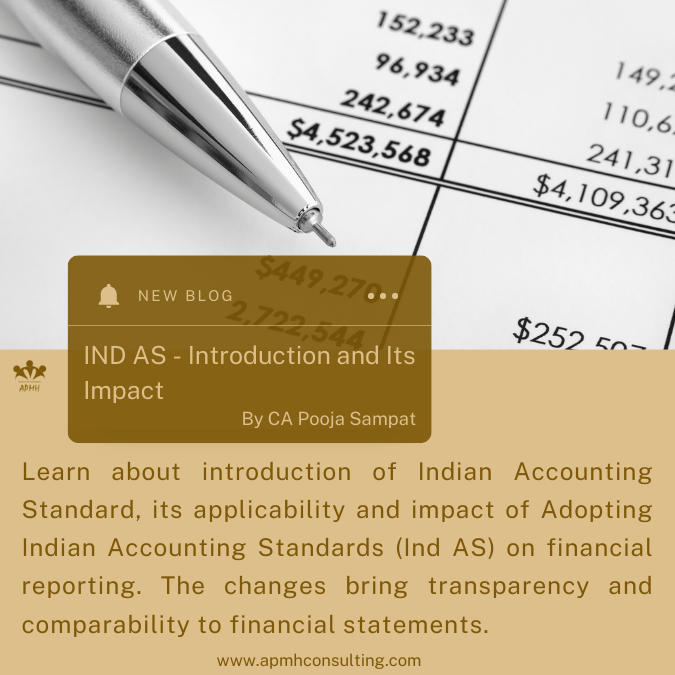20-Aug-2024 IND AS – Introduction and Its Impact
#indas #ifrs #indianaccountingstandards #globalstandards #revenuerecognition #fairvaluemeasurement #segmentreporting #financialinstruments #indiangaapInd AS brings Indian accounting practices in line with global standards, enhancing transparency and comparability in financial reporting. Its adoption is crucial for businesses seeking to attract foreign investment and ensure compliance with international norms.

Introduction of Ind AS in India.
The Indian Accounting Standards (Ind AS) represent a significant milestone in the evolution of financial reporting in India. These standards, which align closely with International Financial Reporting Standards (IFRS), aim to enhance the transparency, comparability, and reliability of financial statements. The introduction of Ind AS has ushered in a new era of accounting practices, affecting a wide spectrum of businesses across the country.
Need for Ind AS.
Prior to the adoption of Ind AS, Indian companies followed the Indian Generally Accepted Accounting Principles (IGAAP). However, the globalization of business and the increasing integration of Indian markets with the global economy necessitated a shift towards more globally recognized standards. The convergence with IFRS aimed to Improve Transparency by providing a clearer and more accurate representation of financial positions, Enhance Comparability by facilitating better comparison of financial statements of Indian companies with their global peers and Attract Foreign Investments by building investor confidence by adhering to internationally recognized accounting standards.
Applicability of Ind AS
For Companies other than banks, NBFCs and Insurance Companies
- All companies which are listed /or in process of listing in or outside India on Stock Exchange.
- Unlisted Companies having net worth of INR 250 crore or more but less than INR 500 crore.
- Holding, Subsidiary, Associate and Joint Venture of above.
Voluntary Adoption of Ind AS can be undertaken by the companies.
For NBFC’s
- NBFC’s whose equity or debt securities are listed or in the process of listing on any stock exchange in India or outside India and having net worth less than INR 500 core
- NBFC’s that are unlisted companies, having net worth of INR 250 crore or more but less than INR 500 crore.
- Holding, Subsidiary, Associate and Joint Venture of above.
Voluntary adoption of Ind AS by NBFCs are not allowed.
The Banking and Insurance Companies shall apply the Ind AS as notified by the Reserve Bank of India and Insurance Regulatory Development Authority (IRDA) respectively. As the same are yet to be notified, Ind AS is not applicable to Banking and Insurance Companies presently.
Key Features and Benefits of Ind AS
- 1. Fair Value Measurement: Emphasis on fair value accounting, providing a more realistic financial position.
- 2. Consolidation of Financial Statements: Mandatory for parent companies to prepare consolidated financial statements.
- 3. Segment Reporting: Detailed reporting of business and geographical segments.
- 4. Financial Instruments: Comprehensive guidance on classification, measurement, and impairment of financial instruments.
Challenges in Adoption
- 1. Complexity: Understanding and implementing Ind AS requires a significant shift in accounting practices and expertise.
- 2. Training and Education: Need for extensive training for accounting professionals and auditors.
- 3. Cost Implications: Initial transition involves considerable costs in terms of system upgrades and consultancy services.
- 4. Data Management: Requirement for detailed and accurate data to comply with the standards.
Key Differences: Ind AS vs. Indian GAAP (AS)
While both Ind AS and Indian GAAP aim to standardize financial reporting, they differ significantly in terms of alignment with international standards, complexity, and detailed requirements:
- 1. Alignment with IFRS:
- - Ind AS: Closely aligned with IFRS with necessary carve-ins and carve-outs to fit the Indian context.
- - Indian GAAP (AS): Based on older international standards with significant deviations and simpler frameworks.
- 2. Fair Value Measurement:
- - Ind AS: Extensive use of fair value measurement for assets and liabilities.
- - Indian GAAP (AS): Primarily based on historical cost with limited use of fair value.
- 3. Revenue Recognition:
- - Ind AS 115: Follows the five-step model for revenue recognition, closely aligned with IFRS 15 but with specific guidance for local practices.
- - AS 9: Simpler principles-based approach to revenue recognition.
- 4. Financial Instruments:
- - Ind AS 109: Detailed guidance on classification, measurement, and impairment of financial instruments.
- - AS 13 and AS 30-32: Less comprehensive and detailed compared to Ind AS.
- 5. Consolidation:
- - Ind AS 110: Requires consolidation based on control, similar to IFRS 10.
- - AS 21: Based on ownership interest, with less emphasis on control.
Conclusion
The introduction of Ind AS marks a significant step towards aligning Indian accounting practices with global standards. Despite the challenges, the long-term benefits of transparency, comparability, and reliability outweigh the initial hurdles. As more companies transition to Ind AS, the Indian financial reporting landscape is set to become more robust and globally competitive.
For businesses, staying informed and prepared for Ind AS compliance is crucial. Continuous education, investment in appropriate systems, and seeking expert advice will facilitate a smoother transition, ensuring that the benefits of adopting these standards are fully realized.
Also, the transition from Indian GAAP to Ind AS represents a significant shift towards international accounting standards, with specific carve-ins and carve-outs to address the unique requirements of the Indian market. Understanding these modifications is crucial for accurate and compliant financial reporting, ensuring that the benefits of global comparability.
Thank you Readers for your Time and Attention. If you have any questions or suggestions, please don't hesitate to reach out on info@apmh.in / pooja@apmh.in. Your input is invaluable.
